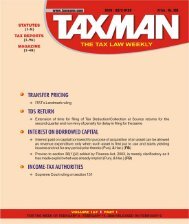CPT V24P7-Art1 (Content).pmd - Taxmann
CPT V24P7-Art1 (Content).pmd - Taxmann
CPT V24P7-Art1 (Content).pmd - Taxmann
Create successful ePaper yourself
Turn your PDF publications into a flip-book with our unique Google optimized e-Paper software.
ground not raised earlier in appeal memo is<br />
governed by rule 11 of the ITAT Rules. This<br />
rule must be read subservient to the provision<br />
in the Act providing for the right of appeal.<br />
Therefore, additional ground that could be<br />
permitted to be raised under rule 11 is the one<br />
that should relate to the subject-matter of the<br />
appeal which, in turn, is linked to the subjectmatter<br />
of the order passed by the first appellate<br />
authority. Further, it is always desired in taxing<br />
statutes that there should be finality to subjectmatter<br />
of appeal. The assessments need not be<br />
thrown to contest throughout the stages of<br />
appeal, revision and reference. Thus, the issues<br />
which are not raised before A.O. or CIT(A) are<br />
presumed to have become final and, therefore,<br />
cannot be raised before Tribunal. However, an<br />
exception has been carved out from this principle.<br />
A question of law can be raised before the<br />
Tribunal for the first time. Hon’ble Apex Court<br />
in National Thermal Power Corpn. Ltd. (supra)<br />
upheld the jurisdiction of the Tribunal to examine<br />
a question of law which arose from the facts<br />
as found by Income-tax Authorities and having<br />
a bearing on the tax liability of the assessee.<br />
Hon’ble Apex Court observed as follows:<br />
“Under section 254 of the Income-tax Act,<br />
the Appellate Tribunal may, after giving<br />
both the parties to the appeal an opportunity<br />
of being heard, pass such orders thereon<br />
as it thinks fit. The power of the Tribunal<br />
in dealing with appeals is thus expressed<br />
in the widest possible terms. The purpose<br />
of the assessment proceedings before the<br />
taxing authorities is to assess correctly<br />
the tax liability of an assessee in accordance<br />
with law. If, for example, as a result of<br />
a judicial decision given while the appeal<br />
is pending before the Tribunal, it is found<br />
that a non-taxable item is taxed or a<br />
permissible deduction is denied, we do<br />
not see any reason why the assessee should<br />
be prevented from raising that question<br />
before the Tribunal for the first time, so<br />
long as the relevant facts are on record<br />
in respect of that item. We do not see any<br />
reason to restrict the power of the Tribunal<br />
under section 254 only to decide the grounds<br />
which arise from the order of the<br />
Commissioner of Income-tax (Appeals).<br />
Both, the assessee as well as the Department,<br />
have a right to file an appeal/cross-objections<br />
before the Tribunal. We fail to see why<br />
the Tribunal should be prevented from<br />
considering questions of law arising in<br />
assessment proceedings, although not raised<br />
earlier. The view that the Tribunal is confined<br />
only to issues arising out of the appeal<br />
before the Commissioner of Income-tax<br />
(Appeals) takes too narrow a view of the<br />
powers of the Appellate Tribunal.”<br />
Therefore, issues relating to facts can be raised<br />
before CIT(A) but within the parameters of<br />
record and proceedings before A.O., whereas<br />
for the first time only legal issues can be<br />
raised before the Tribunal.<br />
CONCLUSION<br />
12345678901234567890123<br />
12345678901234567890123<br />
12345678901234567890123<br />
Since the power of first appellate authority is<br />
co-terminus with that of the A.O., he can entertain<br />
a new claim not raised before the A.O. On the<br />
other hand, the power of the Tribunal is<br />
comparatively restricted to decide new grounds<br />
only when all the facts relating to those grounds<br />
are available on the record. On the other hand,<br />
Tribunal is not vested with such power as<br />
given to the CIT(A) by the Explanation to section<br />
251. It is only vested with the power to pass<br />
such orders on the appeal as it thinks fit.<br />
Therefore, it can consider the new grounds<br />
which are legal in nature and do not require<br />
investigation of facts. From this point of view<br />
a new claim not made before the A.O. could<br />
be made before the CIT(A) or even before the<br />
Tribunal, if all the facts relating to the claim<br />
are already on the record.<br />
• DT - Secs. 139(5), 251 & 254-EC-CIT v. Pruthvi Brokers & Shareholders (P.) Ltd. [2012] 23 taxmann.com 23 (Bom.)<br />
August 1 to 15, 2012 u TAXMANN’S CORPORATE PROFESSIONALS TODAY u Vol. 24 u 57<br />
•••<br />
677











![“FORM NO. 3CEB [See rule 10E] Report from an ... - Taxmann](https://img.yumpu.com/45480232/1/190x245/form-no-3ceb-see-rule-10e-report-from-an-taxmann.jpg?quality=85)





